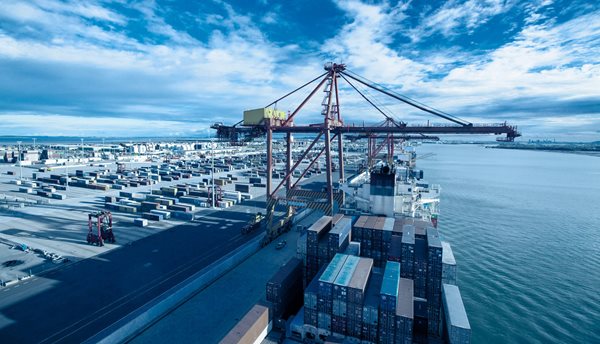The Department of Agriculture, Water and Environment (DAWE) is undertaking a validation trial of the Biosecurity Automated Threat Detection System (BATDS) in partnership with DP World Australia’s Brisbane Terminal to improve surveillance capability at container ports. The system will enable them to scan shipping containers for contaminants and biosecurity risk material as they are being unloaded from cargo ships.
DAWE has issued Industry Advice Notice no. 96-2022: Upcoming Biosecurity Automated Threat Detection System (BATDS) Trial at DP World Australia’s Brisbane Terminal. It is addressed to importers, customs and forwarding brokers and any others in the sea container supply and logistics chain who use DP World Australia’s Brisbane terminal.
Dedicated biosecurity officers located at DP World Australia’s Brisbane Terminal for the duration of the trial will inspect a selection of Country Action List (CAL) and non-CAL sea containers to verify the accuracy of captured images. CAL refers to cargo from high-risk countries and ports and the list is available here.
If successful, this technology could allow DAWE to screen more containers and only intervene on those with an identified biosecurity risk. This would be a more efficient screening process and reduce unnecessary delays for importers of goods arriving in clean containers.
By combining automated cameras and real-time machine learning, they will be able to scan the external surfaces of shipping containers for contaminants and biosecurity risk material (BRM) as they are being unloaded from vessels.
All CAL containers (excluding exempt transhipping containers) unloading at DP World Australia’s Brisbane Terminal will be externally inspected by a biosecurity officer as part of this trial, according to established procedures. Any BRM detected during these inspections will be compared to the images taken by the BATDS camera for verification purposes.
A number of non-CAL containers may also be randomly selected for external inspection during the trial. Importers and logistics providers can expect a minimal delay in the release of non-CAL containers if they are selected for inspection. These containers will have a ‘Terminal Hold’ applied and a ‘Held’ Terminal Status, which will be visible to your customs broker in 1-Stop. Where a ‘Terminal Hold’ is in place, the containers are unable to be moved off wharf, so transport cannot be arranged until the Hold has been removed. These non-CAL container inspections will not attract a charge unless contamination or BRM is detected and treatment required.
We will continue to report on all the issues that affect the global shipping container industry.
The BATDS trial will commence on Tuesday, 14 June 2022 and will continue for approximately 6 months.
For enquiries about the BATDS trial please contact us here at Colless Young. As licensed Customs Brokers and International Freight Forwarders, we handle all your transport needs, by air and sea, both import and export. We are based in Brisbane and offer a complete range of logistics services, including quarantine treatments, warehousing and trucking, through all Australian ports and airports.

